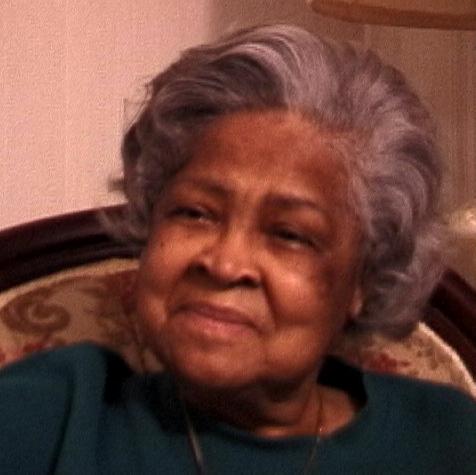“I think that growing up on the lower end, as I did, helped me to overcome what a lot of blacks cannot.” -Mazie Baltimore
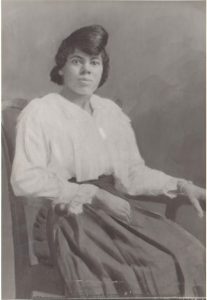
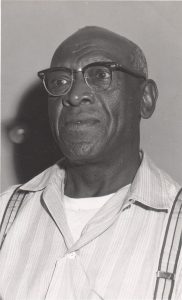 Mazie’s journey starts out in the year 1934, in the town of Sumter, South Carolina, ” sort of a historical place, you’ll find General Sumter’s tomb there,” she explained. Mazie Blanding was the daughter of Nathan and Anna Blanding, as well as a sister to Alexander Blanding. When Mazie was three, Nathan (her father), moved to Steelton in hopes of finding a job and money, which he succeeded in doing. He then sent for the rest of the family, so that they could start their new lives there with him.
Mazie’s journey starts out in the year 1934, in the town of Sumter, South Carolina, ” sort of a historical place, you’ll find General Sumter’s tomb there,” she explained. Mazie Blanding was the daughter of Nathan and Anna Blanding, as well as a sister to Alexander Blanding. When Mazie was three, Nathan (her father), moved to Steelton in hopes of finding a job and money, which he succeeded in doing. He then sent for the rest of the family, so that they could start their new lives there with him.
Mazie admits that she really does not remember the South but she certainly has memories from her life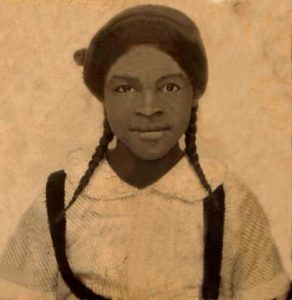 nestled in the block of row homes on 746 South 4th Street. She told me “it [was] a convenient spot because even though it was not, company housing, all the men had to do was walk down the hill to go to the plant.” Mazie’s father worked in the Steel mill and her mother worked as a domestic, for a lawyer by the name of King, in Harrisburg. Mazie says of her mother’s job, “it was the depression, and we always looked forward to her coming home because she always brought goodies home for us and we would get the Sunday paper.”
nestled in the block of row homes on 746 South 4th Street. She told me “it [was] a convenient spot because even though it was not, company housing, all the men had to do was walk down the hill to go to the plant.” Mazie’s father worked in the Steel mill and her mother worked as a domestic, for a lawyer by the name of King, in Harrisburg. Mazie says of her mother’s job, “it was the depression, and we always looked forward to her coming home because she always brought goodies home for us and we would get the Sunday paper.”
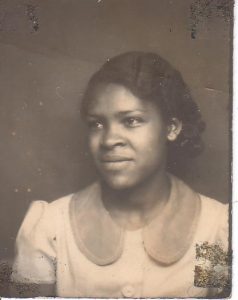 However, as Mazie stated, “it was the depression” and the children needed to help out around the house. She explained that “if it was during the school year, you would get up, you rush, you have your breakfast”. “But in the evening we came home and it was always rush, rush, rush, you get the dinner, dishes to wash.. on Saturdays you did your house work.” Mazie’s family was also dedicated to their church, The Monumental African Methodist Episcopal Church. Mazie explained to me some of her religious beliefs, that in life you need to do three things “pray, work, then play.” Despite the chores, the time spent at church, and the Great Depression, Mazie experienced some memorable times on the 700 block of South 4th Street. But her memories were limited to the 700 block, because she was not allowed to go beyond her street. She recalled that “there was a whistle that blew at quarter to nine and you have to be on your porch then.” Get home and after the dishes were washed and dried, it was time for fun until that whistle blew. Families had little during the depression, and Mazie described the importance of a bicycle in the neighborhood, “If you were lucky enough to have a bicycle, you naturally, the children shared one bicycle, you take turns.”
However, as Mazie stated, “it was the depression” and the children needed to help out around the house. She explained that “if it was during the school year, you would get up, you rush, you have your breakfast”. “But in the evening we came home and it was always rush, rush, rush, you get the dinner, dishes to wash.. on Saturdays you did your house work.” Mazie’s family was also dedicated to their church, The Monumental African Methodist Episcopal Church. Mazie explained to me some of her religious beliefs, that in life you need to do three things “pray, work, then play.” Despite the chores, the time spent at church, and the Great Depression, Mazie experienced some memorable times on the 700 block of South 4th Street. But her memories were limited to the 700 block, because she was not allowed to go beyond her street. She recalled that “there was a whistle that blew at quarter to nine and you have to be on your porch then.” Get home and after the dishes were washed and dried, it was time for fun until that whistle blew. Families had little during the depression, and Mazie described the importance of a bicycle in the neighborhood, “If you were lucky enough to have a bicycle, you naturally, the children shared one bicycle, you take turns.”
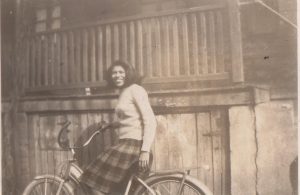 In her interview, Mazie described all the childhood games such as hopscotch, street ball, roller-skating, and dumb school, and she also carefully explained the racial makeup of her 700 block friends. She refers to this inter-racial neighborhood as being “like one big family”. “Irregardless of who they [the children] were, if you were doing something that you shouldn’t be doing [the adults] corrected you, you had to listen to them,” she said. However, the family setting of this block not only shared its rules and enforcement, it also shared its different ethnic traditions. “What I really, really, remember and appreciate, was that the Serbians’ celebrate a Christmas in January”. The neighbors all gathered together in a Serbian home and “roast a pig, put a stick right through the pig, they roast it, roast it, with lots of garlic and stuff you know. And then they had a bakery up the street from there they would bring bread down. And we were all sitting around trying to sing their Christmas carols, a mixture of Christmas carols, and you would try to sing in their language and you dip the bread in the meat juice that is coming out, and you would eat and play games and whatnot,” she reminisced.
In her interview, Mazie described all the childhood games such as hopscotch, street ball, roller-skating, and dumb school, and she also carefully explained the racial makeup of her 700 block friends. She refers to this inter-racial neighborhood as being “like one big family”. “Irregardless of who they [the children] were, if you were doing something that you shouldn’t be doing [the adults] corrected you, you had to listen to them,” she said. However, the family setting of this block not only shared its rules and enforcement, it also shared its different ethnic traditions. “What I really, really, remember and appreciate, was that the Serbians’ celebrate a Christmas in January”. The neighbors all gathered together in a Serbian home and “roast a pig, put a stick right through the pig, they roast it, roast it, with lots of garlic and stuff you know. And then they had a bakery up the street from there they would bring bread down. And we were all sitting around trying to sing their Christmas carols, a mixture of Christmas carols, and you would try to sing in their language and you dip the bread in the meat juice that is coming out, and you would eat and play games and whatnot,” she reminisced.
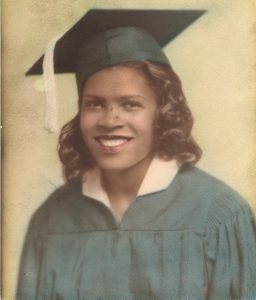 Although she had many stories of her childhood activities, she also talked quite a bit about her schooling. “The lower end, where I grew up, there were four grades, first through fourth. From there you went to the Felton Building, for Junior High. Then right next to that, was the High School.” She attended elementary school at the Fothergill School. In High School she recalled how she could not attend the High School dances because she was an African American. They had dances called “Tri-High Y” dances instead. Mazie remembers that “the only way I could go, not with a date, but with my brother.” While in High School Mazie worked at the Penn Harris Hotel as an elevator operator. She also taught Sunday school classes at The Monumental A.M.E. Church. She then graduated in 1942.
Although she had many stories of her childhood activities, she also talked quite a bit about her schooling. “The lower end, where I grew up, there were four grades, first through fourth. From there you went to the Felton Building, for Junior High. Then right next to that, was the High School.” She attended elementary school at the Fothergill School. In High School she recalled how she could not attend the High School dances because she was an African American. They had dances called “Tri-High Y” dances instead. Mazie remembers that “the only way I could go, not with a date, but with my brother.” While in High School Mazie worked at the Penn Harris Hotel as an elevator operator. She also taught Sunday school classes at The Monumental A.M.E. Church. She then graduated in 1942.
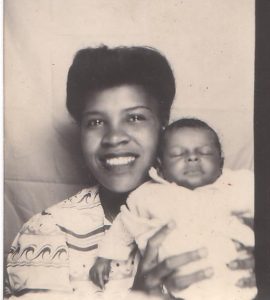 After she graduated she worked for a caterer in Harrisburg where she did bookkeeping, and it was her boss who introduced Mazie to her future husband. Her husband, at that time, was attending West Virginia State University. After he graduated, they married and Mazie started working for the Federal Government. While they were living in Altoona, Pennsylvania they had a baby girl, Patricia.
After she graduated she worked for a caterer in Harrisburg where she did bookkeeping, and it was her boss who introduced Mazie to her future husband. Her husband, at that time, was attending West Virginia State University. After he graduated, they married and Mazie started working for the Federal Government. While they were living in Altoona, Pennsylvania they had a baby girl, Patricia.
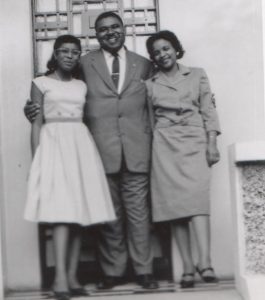 The trio then moved to Europe for her husband’s job with the foreign service. Patricia attended and graduated in Europe from Munich American High School. Mazie loved her experiences in Europe and told me, “the happiest years of my life were spent in Europe.” After her daughter graduated the whole family moved back to the United States. Mazie talked about how different the segregation and discrimination was in the United States and Europe. She explained that in Europe, she would always be served, she was always given respect, but not always in the United States.
The trio then moved to Europe for her husband’s job with the foreign service. Patricia attended and graduated in Europe from Munich American High School. Mazie loved her experiences in Europe and told me, “the happiest years of my life were spent in Europe.” After her daughter graduated the whole family moved back to the United States. Mazie talked about how different the segregation and discrimination was in the United States and Europe. She explained that in Europe, she would always be served, she was always given respect, but not always in the United States.
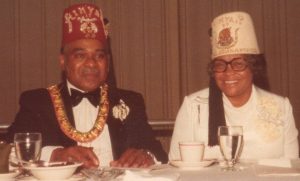 Mazie and her husband settled down in Harrisburg Pennsylvania where she stayed an active member of the A.M.E. Church in Steelton, as well as becoming a Mason in the Masonic Order, along with her husband. Her husband has since passed away, but she still stays very active. She is still involved with the Mason’s, the church, and RSVP (Retired Senior Citizen’s Program), as well as planning different activities such as dinner and luncheons banquets for all of these organizations.
Mazie and her husband settled down in Harrisburg Pennsylvania where she stayed an active member of the A.M.E. Church in Steelton, as well as becoming a Mason in the Masonic Order, along with her husband. Her husband has since passed away, but she still stays very active. She is still involved with the Mason’s, the church, and RSVP (Retired Senior Citizen’s Program), as well as planning different activities such as dinner and luncheons banquets for all of these organizations.
Return to Reflections of the Past – Then
